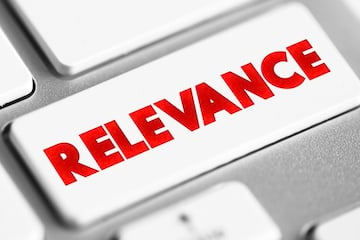
For years, businesses published blogs to attract traffic, any traffic. An online appliance store, for example, might publish an article unrelated to appliances so long as it attracts visitors to the site.
But irrelevant content in circa 2025 likely hurts organic search visibility and confuses large language models.
Here’s how search and AI algorithms treat content relevance.
Organic Search
Google once assigned relevance signals on a page level. A page could rank well and drive traffic even if its content was irrelevant to the site.
Around 2021, however, Google began emphasizing “domain-level relevance” signals.
Prominent sites started experiencing traffic losses. Take HubSpot, for example. In April 2022, HubSpot ranked for search queries unrelated to its core marketing platform, such as “personality test” and “real estate license.” Then it lost roughly 80% of its organic traffic, per Semrush.
HubSpot subsequently deleted all unrelated pages, resulting in much less traffic but higher overall revenue, presumably owing to attracting qualified prospects, not mere visitors.
According to Semrush, HubSpot has maintained top rankings for relevant queries, such as “conversion rate optimization” and “brand strategy.”
In early 2024, Google announced an algorithm update for site reputation abuse, which Google defined as “when third-party pages are published with little or no first-party [editorial] oversight or involvement, where the purpose is to manipulate Search rankings by taking advantage of the first-party site’s ranking signals.”
Site reputation abuse was another signal that irrelevant content could damage overall site rankings. Google even reportedly deindexed entire sections of various offending business publications.
Large Language Models
We’re all learning how to optimize for mentions and citations in ChatGPT, Claude, Gemini, AI Overviews, and more. Publishing irrelevant content likely confuses those models.
LLMs focus on a site’s context and expertise to determine whether to mention or cite it. Irrelevant content can dilute the context and confuse AI algorithms, lowering the chances of the site appearing in AI-driven answers.
In short, irrelevant content that doesn’t address your business niche and value proposition may hurt your online visibility in AI as well as Google.
Unless you are in a publishing business, consider removing irrelevant content. Unfortunately, “relevance” is vague. Content doesn’t have to describe your products directly. It could address the problems of your target audience and still be helpful and relevant.
Here’s a table for managing irrelevant content.
| Action | Content Type | Tips |
|---|---|---|
| Delete content and let links go to a 404 page. | Any content that becomes irrelevant to the business. | Remove all internal links to these pages; confirm with Screaming Frog or a similar crawler. |
| Leave content published, but redirect inbound links; block crawlers in robots.txt file. | Old instructions or tutorials on using discontinued products or outdated features. Users of old products will still use this content. | Block all crawlers, including AI crawlers. Block only an archive folder or equivalent, not the entire site. |
| Noindex the URLs. | Any irrelevant content. Some sites prefer noindexing because it avoids broken URLs or creating new folders. However, in most cases, it’s the weakest choice because noindexing is not supported by many AI platforms, and it won’t stop any bots from crawling old URLs, resulting in unnecessary server load and page speed hits. | Noindexing blocks irrelevant content from ranking in Google (and being penalized from site reputation abuse), but I do not recommend it in most cases. |




